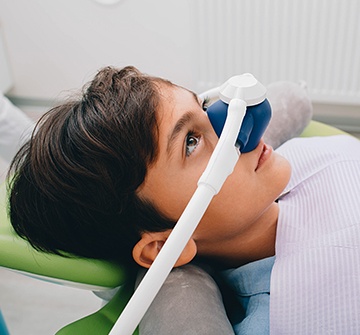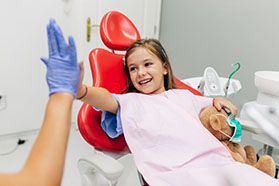Sedation Dentistry for Kids – Clinton, MA
Give Your Child a Comfortable Dental Experience
We get that the dental office is probably not your child’s favorite place to visit. However, children who suffer from anxiety, nervousness, or a phobia of dentistry are prone to more dental problems as they age. Our trained dentists and team members are exceptional at helping young patients relax during your child’s routine appointments, no matter how young they may be. With that said, Simply Pediatric Dentistry & Orthodontics recognizes that sometimes patients need a little extra push. We provide sedation techniques that are not only safe, but designed to make their visit as smooth and comfortable as possible. Give us a call today to learn more about sedation dentistry in Clinton, MA!
Why Choose Simply Pediatric Dentistry & Orthodontics for Sedation Dentistry for Kids?
- Experienced Pediatric Dentists By Your Side
- Welcoming Patients of All Ages
- Calming and Comfortable Dental Office Environment
Nitrous Oxide Dental Sedation

Chances are you already know what nitrous oxide is, especially if you’ve heard it referred to as “laughing gas.” This sedative is inhaled through a nasal mask that is worn by the patient after they are already in the dental chair. It’s a mild sedative and is appropriate for children of almost any age. After a few minutes of slowly breathing in the gas, your child should feel incredibly relaxed, even though they can still speak with our team members about their comfort. If they need to answer questions or tell us how they’re feeling, they can easily do so. Even better, nitrous oxide quickly wears off after the mask is removed, making it easy for them to continue their day.
Oral Conscious Sedation

For children who have more moderate levels of dental fear or anxiety, oral conscious sedation may be a better option. Instead of being administered as a gas, a sedative is taken in pill form, usually in advance of the appointment so that it has time to begin taking effect. You can expect your child to achieve a deep and comfortable level of relaxation that streamlines and simplifies dental care. While the sedative does not typically put your child to sleep, it will make the memory of their appointment and treatment fuzzier, which further alleviates anxiety.
What Is Oral Conscious Sedation?

Oral conscious sedation relies on prescribed medication, usually in pill or sometimes liquid form, to help patients who suffer from dental-related anxiety or other issues receive dental care comfortably. It’s fully capable of easing the tensest of nerves and drastically reducing the fear that children experience concerning treatment. And better yet, it benefits all parties involved in the sense that the dental staff generally has an easier time performing treatment on sedated patients! It’s also worth noting that many children tend to prefer oral conscious sedation compared to nitrous oxide since it doesn’t involve the use of a nasal mask.
How Does Oral Conscious Sedation Work?

It’s important to distinguish that oral conscious sedation does not cause unconsciousness; rather, it induces a deep and safe state of relaxation. Your child will probably feel sleepy after taking the pill, and they might doze off a little bit, but they’ll still be able to respond and can easily be stirred. The sedative is administered before the appointment so that by the time your child is seated in the chair, they’ll feel relaxed and prepared for their visit—and whether they’re there for a simple checkup, filling or any other sort of treatment, things are set up to go smoothly! The dental staff will monitor your child throughout their treatment and after a few hours, they should feel totally back to normal.
Is Your Child a Good Candidate for Oral Conscious Sedation?

The only way to accurately assess if your little one is a good candidate for oral conscious sedation is to have them meet with our team. During their consultation, we’ll review their medical history and ensure that they can safely be administered the sedation. If your child exhibits any of the following, assuming they’re fit for treatment, they’ll benefit greatly from oral conscious sedation:
- Mild to moderate dental fear or anxiety
- Sensitive gag reflex
- Inability to sit still or keep their mouth open for extended periods
- Previous dental trauma or bad experiences
- Multiple or complex procedures are necessary
- Difficulties getting numb with anesthesia
Kid’s Sedation Dentistry FAQs
Is sedation dentistry safe for kids?
There has been extensive research conducted on sedation dentistry over the last several decades, and both nitrous oxide and oral conscious sedation are considered safe for patients of all ages. With that said, there are some children who aren’t a candidate. For example, if your child has asthma or a different condition that makes it difficult for them to breathe, then nitrous oxide is not ideal since it’s administered through a nasal mask. Rest assured, we will learn all about their medical and dental history at their first appointment so we can determine if sedation dentistry can be added to their treatment plan safely.
Is sedation dentistry covered by insurance?
Sedation dentistry is often classified as a “luxury” treatment, so it’s not usually covered. As always, there are some exceptions. If your child has cerebral palsy, autism, or another disability that makes it virtually impossible to get the dental care they need without nitrous oxide or oral conscious sedation, then your dental insurance may cover it. It’s also possible that your provider will cover the cost if your child needs more extensive treatment, like multiple tooth extractions. Ultimately, your coverage depends on the fine print on your plan, so it’s worth taking a look and letting us know if you have any questions!
Will dental sedation put my child to sleep?
Although sedation dentistry is often called “sleep dentistry,” it doesn’t actually put your child to sleep. With both nitrous oxide and oral conscious sedation, your child will be awake throughout the entire procedure. Of course, they may feel so relaxed that they nod off. If that happens, we can gently nudge them awake.
Is sedation dentistry worth it?
This is a common question, especially for parents who are paying for sedation dentistry out-of-pocket. All we can say is that nitrous oxide and oral conscious sedation effectively alleviate stress, nerves, and anxiety, allowing you and your child to have the positive and peaceful experience you both deserve. It also allows us to get more dental work done in a single visit, which benefits your child’s oral health and frees up your schedule.
Will my child remember anything with dental sedation?
Although your child will be awake during the procedure, it’s likely that they won’t remember much about their time in the treatment chair. That’s because of the retrograde amnesia effect that often happens with sedation dentistry. This is a positive for many children (and adults!) because it helps form a more positive association with getting dental work.
